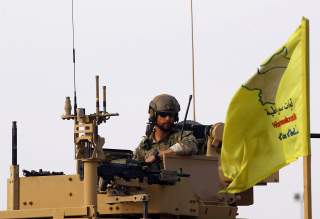Kurds and Arabs in Northeast Syria: Power Struggle or Power Sharing?
Stabilizing and rebuilding the diverse and complex region of northeastern Syria may prove even more difficult than defeating ISIS.
Despite these challenges, the Self Administration does in fact include many people with university degrees with many years of professional experience. The Deir Ezzor Civil Council (DCC) is co-headed by Dr. Ghassan Al Youssef, who has a Ph.D. in economics, and Layla Hassan, who has a degree in Arabic Literature. During a visit to Deir Ezzor in March, we met with a number of members of the Self Administration. We visited a hospital with a physician, Dr. Hussam Al-Ali, who works for the Self Administration as the head of Health and Medical Services. We also visited a school with Kamal Moussa, the head of Education. It was difficult not to be impressed by their professionalism and determination to rebuild their schools and hospitals despite constant threats and little outside help. Other members of the DCC include Tariq Rashid, head of Humanitarian Affairs, and Said Al-Said, head of the Justice Committee, who are both lawyers, and Jihad Ligi Head of Municipal Services, who is a civil engineer. They work for the administration despite death threats from ISIS, Damascus and Turkey. In summary, the contention that the Self Administration does not employ educated professionals is inaccurate.
Concluding Remarks
The Self Administration of Northeast Syria is a work-in-progress, particularly in newly liberated areas like Deir Ezzor that suffered for years under ISIS rule. If the United States wants to ensure the enduring defeat of the Islamic State, we should encourage all seventy-nine members of the Global Coalition to increase their financial and political support for stabilization and reconstruction. The coalition itself acknowledged that ISIS is trying to increase “recruitment by exploiting popular discontent over the lack of infrastructure in war-torn urban areas.” This should include an investment in the civilian educational infrastructure of the region, literacy training as part of SDF training, and encourage the merit-based promotion of officers who graduate from SDF military academies. U.S. and coalition officials should also pressure Turkey and Iraq to open the borders for the delivery of humanitarian goods, including school supplies so that all schools are fully equipped for the beginning of the school year in September. The overarching objective should be to make the communities of northeastern Syria resilient against any possible re-emergence of ISIS. This will require professional, inclusive, and effective security forces. The United States has a rare opportunity to positively impact the human development of the region. The time to act is now.
Amy Austin Holmes is a fellow in the Middle East Program at the Wilson Center, visiting scholar at Harvard University’s Weatherhead Center, and associate professor at the American University in Cairo. She is the author of Social Unrest and American Military Bases in Turkey and Germany since 1945. Follow her on Twitter @AmyAustinHolmes
Wladimir van Wilgenburg is an Erbil-based analyst of Kurdish politics, journalist at Kurdistan24, and coauthor of the book The Kurds of Northern Syria: Governance, Diversity and Conflicts published by IB Tauris in 2019. Follow him on Twitter @vvanwilgenburg
Image: Reuters

